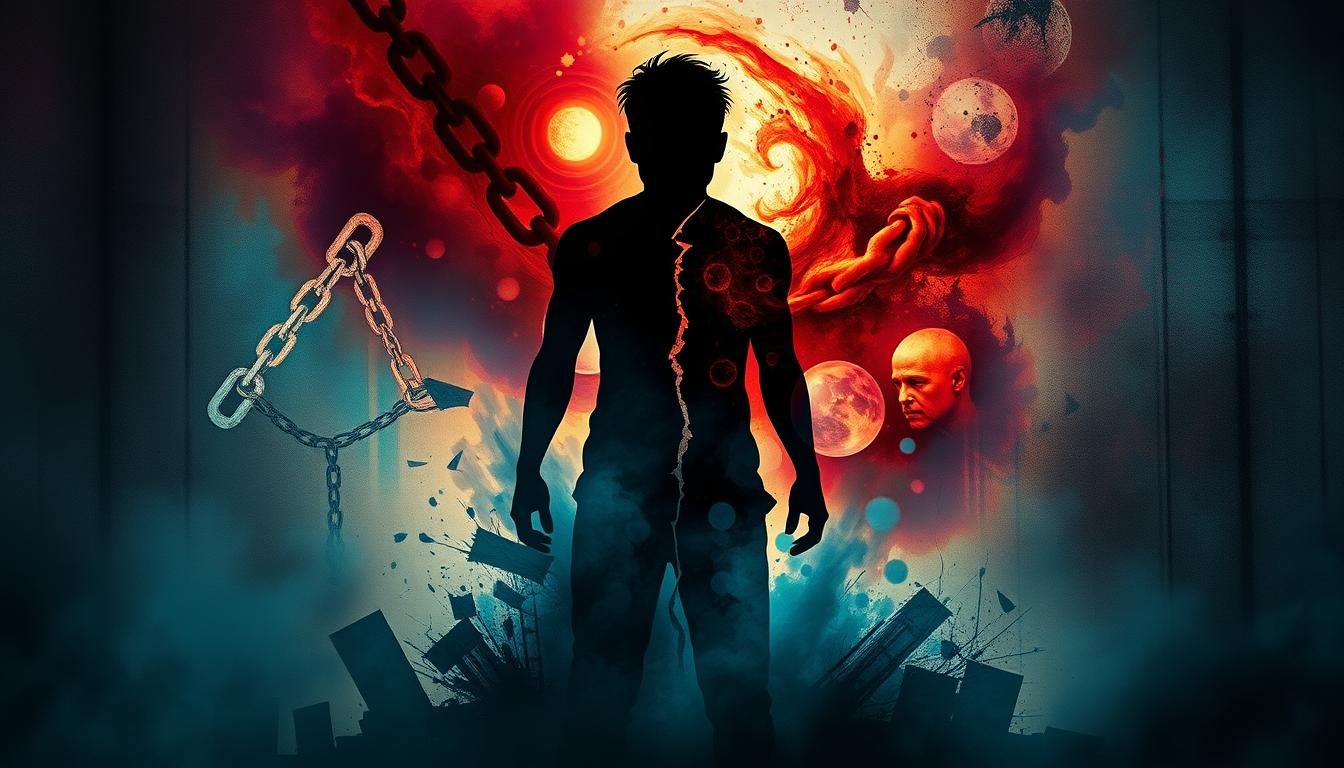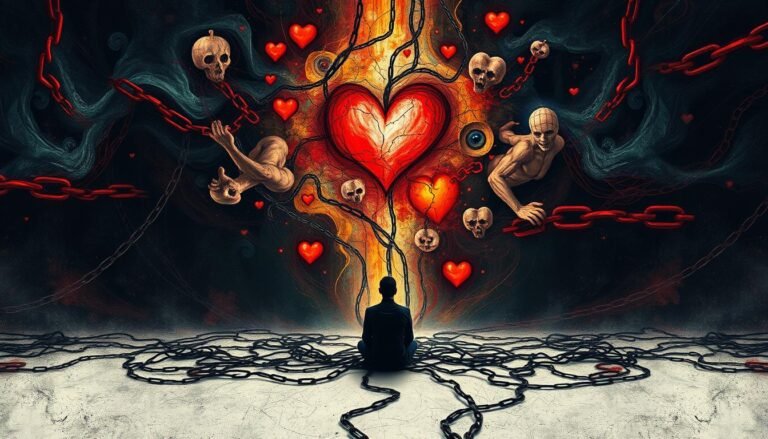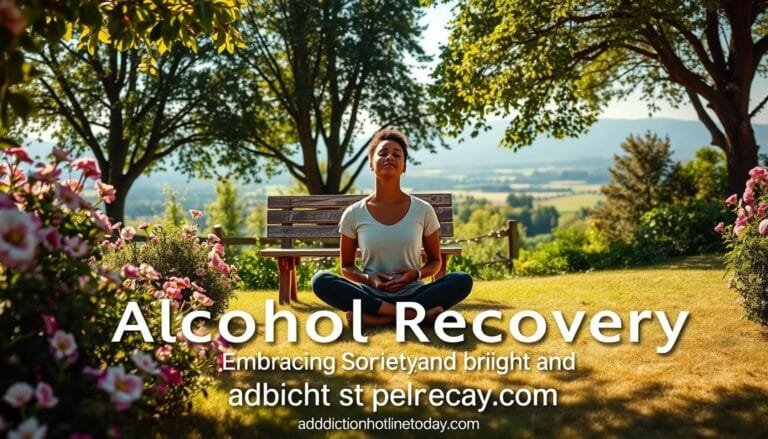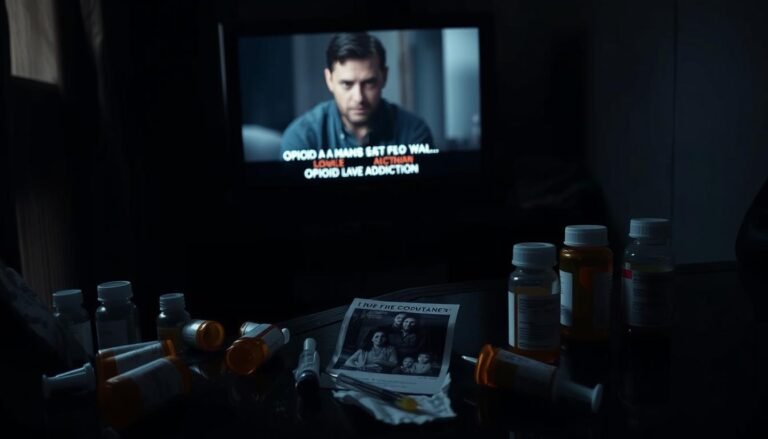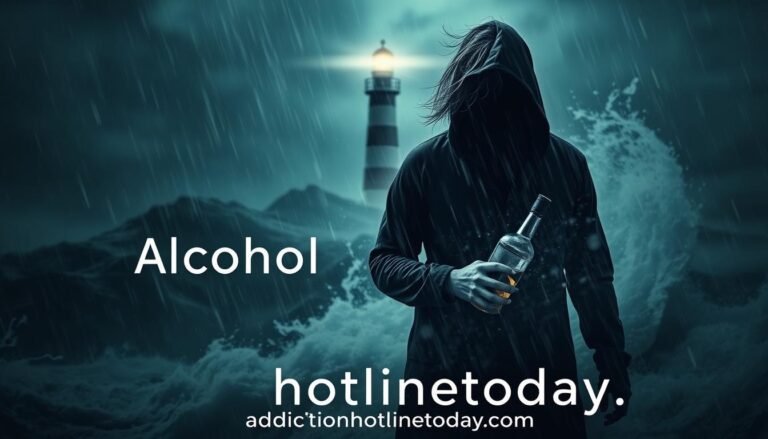Understanding Addiction and Mental Health Today
The journey through addiction is deeply personal and universal. It brings feelings of isolation and despair. Yet, there’s always hope, showing the strength of the human spirit and the power of support.
Addiction affects millions in the U.S., with nearly 23 million addicted to alcohol or drugs. It hijacks the brain’s reward system, leading to intense cravings and loss of control. It’s a disease that doesn’t stand alone; it often comes with mental health issues, affecting nearly 38 percent of those struggling.
The link between addiction and mental health is complex. Traumatic experiences like violence and abuse raise the risk of addiction. At the same time, mental illness can lead to addiction as people seek to cope with their feelings.
Key Takeaways
- Addiction is a complex disease that affects the brain’s reward system, leading to intense cravings and loss of control.
- Nearly 23 million Americans are addicted to alcohol or other drugs, with alcohol being the most commonly abused substance.
- Addiction and mental health disorders often co-occur, with 38% of adults with substance use disorders also facing mental health challenges.
- Traumatic experiences, such as violence and abuse, can increase the risk of developing a substance use disorder.
- Social support and professional treatment are key in tackling addiction and mental health issues together.
The Science Behind Addiction: How It Changes the Brain
Addiction is a complex issue that affects millions worldwide. It involves the brain’s chemistry, with neurotransmitters like dopamine, serotonin, GABA, and glutamate being key. Knowing how addiction works is key to creating good addiction therapy and psychiatric care.
Understanding Dopamine’s Role in Addiction
The brain’s reward system, centered in the nucleus accumbens, is all about dopamine. Drugs and alcohol make dopamine surge, making us feel good and want more. But, the brain gets used to it, making it less pleasurable, leading to tolerance.
Brain Structure Changes and Neural Pathways
Long-term drug use changes the brain’s structure and function. It affects areas like the prefrontal cortex, amygdala, and hippocampus. These changes can cause problems with attention, memory, and making decisions, even after stopping use.
The Development of Tolerance
As the brain gets used to substances, it needs more to feel the same effect. This is tolerance, a key sign of addiction. It often means using more of the substance. The hippocampus and amygdala remember cues linked to the substance, leading to strong cravings.
Grasping the brain chemistry and neural pathways of addiction is vital. It helps in creating effective addiction therapy and psychiatric care. By tackling addiction’s root causes, healthcare can offer tailored treatments for lasting recovery.
Identifying the Signs and Stages of Addiction
Addiction is a serious brain disease that can cause a lot of harm if not treated. The American Society of Addiction Medicine says addiction is a chronic condition. It involves compulsive substance use or behavioral patterns. It develops gradually, taking months or years to progress.
The first stage of addiction is when someone starts using a substance or engaging in a behavior for fun. As they use more, they might need more to feel the same effect. This can lead to dependence, where they feel sick when they try to stop.
Once addiction takes hold, people often can’t control their use or behavior. They might ignore important parts of their life. Signs of addiction include:
- Using more of a substance or engaging in a behavior more frequently than in the past
- Experiencing withdrawal symptoms when not using or engaging in the behavior
- Lying about the extent of substance use or behavior
- Failing to meet work, school, or family obligations due to substance use or behavior
- Continued use or engagement despite negative consequences
Spotting these signs early is key to getting help. Addiction affects a person’s mental, physical, and social health. Places like Crest View Recovery Center offer personalized treatment to help people overcome addiction and mental health issues.
| Addiction Statistic | Value |
|---|---|
| Americans struggling with addiction | About 21 million |
| Individuals who seek treatment for addiction | Very few |
| Age of first substance use exposure | Before 18 |
| Risk factors for addiction | Family history, mental health conditions, trauma |
| Consequences of addiction | Job loss, academic failure, social isolation, abandoning hobbies |
| Difficulty quitting addiction without professional help | Nearly impossible |
| Risk of relapse after treatment | Exists even after recovery |
Recognizing addiction’s signs and stages is the first step to getting help. Understanding addiction helps individuals and their loved ones take action. They can work towards long-term recovery.
“Addiction is not a choice, it’s a chronic brain disease. With the right treatment and support, recovery is possible.”
The Complex Relationship Between Addiction and Mental Health
The link between addiction and mental health is complex. About 50 percent of individuals with severe mental disorders also face substance abuse. Also, 37 percent of alcohol abusers and 53 percent of drug abusers have serious mental illnesses. This calls for special treatment that tackles both addiction and mental health issues.
Co-occurring Disorders Explained
When someone has a mental health disorder and a substance use disorder at the same time, it’s called a co-occurring disorder or dual diagnosis. These conditions can make each other worse, creating a hard cycle to break. In fact, of all people diagnosed as mentally ill, 29 percent abuse alcohol or drugs.
Impact on Treatment Approaches
Dealing with co-occurring disorders needs a whole and joined-up approach. Old ways of treating, focusing on one issue at a time, don’t work well. Approximately one in five individuals with an eating disorder will develop a Substance Use Disorder (SUD) at some point in their lifetime. This shows the need for special programs for dual diagnosis.
Risk Factors and Vulnerabilities
Some people are more likely to get co-occurring disorders. In a recent US study, adults with dual diagnoses accounted for 26% of those with psychiatric disorders, 37% of those with SUDs, and 18% of the total 76 million adults with either condition. Also, the prevalence of dual diagnoses among children and adolescents undergoing treatment for psychiatric conditions ranged from 18% to 54%, with an average prevalence of 33%. Things like genetics, trauma, and stress can make someone more likely to face this complex mix of mental health and addiction.
Modern Treatment Approaches for Dual Diagnosis
Treating dual diagnosis, where mental health and substance use disorders occur together, requires a detailed plan. Integrated treatment tackles both issues at once. It uses proven therapies, medication, and holistic methods.
Mental health counseling is a key part of modern treatment. Therapies like Cognitive Behavioral Therapy (CBT) and Dialectical Behavior Therapy (DBT) help manage mental health. They teach coping skills and emotional control.
Addiction therapy is also vital. Medications can help with withdrawal, cravings, and mental health issues. It’s important to manage these medications carefully.
At rehabme.org, we tackle dual diagnosis with personalized care. Our team creates a treatment plan for each person. This approach helps our clients recover and feel better in the long run.
“Addressing both mental health and substance use disorders simultaneously is critical for lasting recovery.” – Dr. Emily Thompson, Clinical Director at rehabme.org
The modern treatment for dual diagnosis combines mental health counseling, addiction therapy, and medication. This approach helps people deal with their conditions and stay sober and mentally stable.
Trauma’s Role in Mental Health and Substance Abuse
Childhood trauma can lead to substance use disorders later in life. The Adverse Childhood Experiences (ACE) study found a link. Trauma can change brain development, making stress hard to manage.
This can start a cycle where trauma leads to difficult emotions. People might turn to substances for relief.
The link between trauma and addiction is clear. Over 30% of adults with addiction had childhood trauma. Each additional trauma increases the risk by 30-40%.
Symptoms like a negative worldview and social isolation can make addiction worse.
Childhood Trauma and Addiction Risk
Experiences like violence and neglect in childhood raise addiction risk. For each additional adversity, the risk goes up by 30-40%.
PTSD and Substance Use Connection
People with PTSD often use substances to cope. This can lead to a cycle of dependency. Rates of PTSD in addiction treatment are high, showing the need for trauma-informed care.
Healing Approaches for Trauma-Based Addiction
Trauma-informed care (TIC) is key in treating addiction. It focuses on safety and trust. It also includes yoga and therapies like “COPE” and “Seeking Safety.”
“Addiction is an act of dissociation and a coping mechanism to deal with feeling constantly threatened, requiring awareness and strategies to reconnect with the present moment.”
The Power of Professional Support and Therapy
Recovering from addiction and mental health issues needs strong professional help. Addiction counseling and therapy with mental health professionals offer key support. They provide strategies and emotional guidance for lasting wellness.
Therapies like motivational interviewing and family therapy are proven to work. They help with addiction and mental health problems together.
Getting ongoing support is key to keeping recovery on track. Therapists and counselors help find the addiction’s root causes. They build strength and empower individuals.
Regular therapy sessions are a safe place to talk about feelings. They help overcome obstacles and find personal ways to manage issues.
If you or someone you know is fighting addiction, addictionhotlinetoday.com can help. They offer addiction counseling and mental health resources near you. Professional help is essential for lasting recovery.
“Addiction is a disease, and recovery is a process. With the right professional support and evidence-based therapies, individuals can overcome the challenges of addiction and reclaim their lives.”

Professional support and therapy sessions are vital in recovery. Working with mental health professionals helps build skills and emotional strength. This way, people can stay sober and improve their mental health for good.
Behavioral Therapy and Mindfulness in Recovery
Two key tools help people in addiction recovery: Cognitive Behavioral Therapy (CBT) and mindfulness. These methods help develop coping skills, manage triggers, and lower relapse risk.
Cognitive Behavioral Therapy Techniques
CBT is a common therapy that changes negative thoughts and behaviors linked to addiction. It helps people see and change unhealthy beliefs. This includes finding triggers, learning new coping skills, and setting goals.
Mindfulness-Based Interventions
Mindfulness, based on old meditation ways, is now big in recovery. It includes mindful breathing, body scans, and meditation. These practices increase self-awareness and emotional control. They help manage cravings, reduce stress, and bring calm.
Building Healthy Coping Mechanisms
Using CBT and mindfulness daily helps recovery and mental health. Mindfulness-based cognitive therapy (MBCT) mixes CBT and mindfulness. It helps manage thoughts, feelings, and actions better. Through activities like journaling and nature walks, people build coping skills for recovery.
| Technique | Description | Benefits |
|---|---|---|
| Cognitive Behavioral Therapy (CBT) | A therapeutic approach that helps individuals recognize and change negative thought patterns and behaviors associated with substance use. | Empowers individuals to make positive changes, develop alternative coping skills, and set achievable goals. |
| Mindfulness-Based Interventions | Practices such as mindful breathing, body scans, and meditation that cultivate self-awareness and emotional regulation. | Helps manage cravings, reduce stress, and foster a sense of inner calm, contributing to long-term recovery. |
| Mindfulness-Based Cognitive Therapy (MBCT) | A combination of CBT and mindfulness principles, helping individuals manage their thoughts, feelings, and behaviors more effectively. | Provides a complete set of healthy coping mechanisms for addiction recovery challenges. |
CBT and mindfulness practices are key in addiction recovery. They help build coping skills and improve behavioral health. This leads to lasting sobriety and better overall well-being.
Understanding Chemical Imbalances and Mental Health
Keeping our brain chemistry healthy is key to our mental health. Neurotransmitters like dopamine and serotonin help control our mood and thoughts. When these neurotransmitters get out of balance, it can lead to mental health issues like depression, anxiety, and addiction.
Studies show that genetics, stress, and medical conditions can mess with our brain chemistry. For example, hormonal problems can raise the risk of diabetes and infertility. Chronic stress can also harm our nervous, digestive, and reproductive systems, causing anxiety and depression.
Medicines like SSRIs and antidepressants can help fix chemical imbalances in the brain. They support mental health treatment. Also, therapists use methods like Cognitive Behavioral Therapy (CBT) and mindfulness to help people manage their mental health.
Learning about neurotransmitters and brain chemistry helps us find better ways to treat mental health. Getting help from professionals and taking a holistic approach to mental health is important. It helps us live a balanced and fulfilling life.
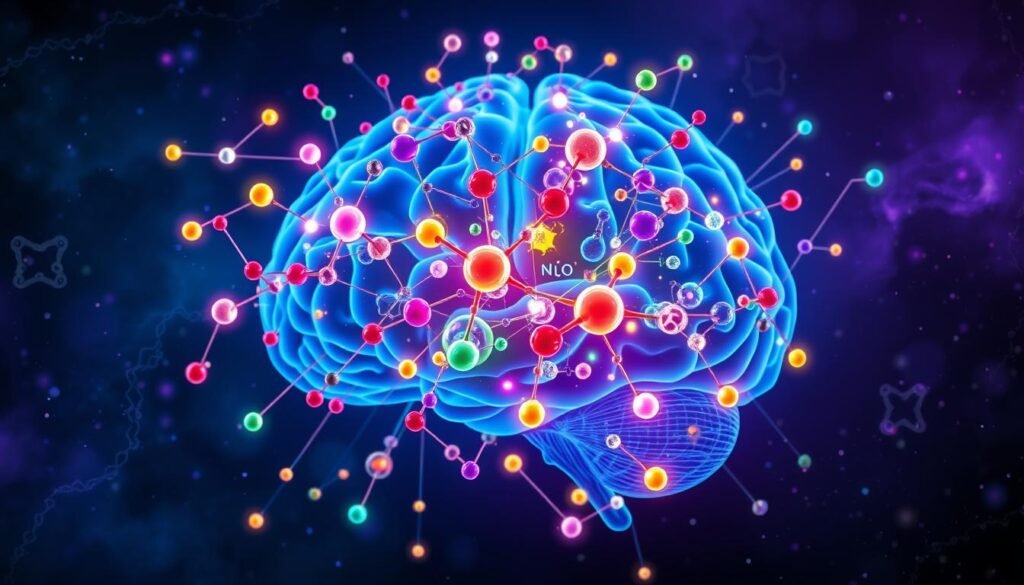
“The brain is the most complex organ in the human body, and its chemical balance is vital for our mental well-being. Understanding the link between brain chemistry and mental health is key to finding effective treatment strategies.”
Support Systems and Recovery Resources
Social support is key in overcoming addiction and managing mental health. Family support networks offer emotional backing and can join family therapy. Local support groups, treatment centers, and mental health clinics provide help and connection.
Family Support Networks
Loved ones are essential in recovery, creating a safe space for rebuilding. Family support groups and therapy teach about addiction and set boundaries. They empower family members to support their loved ones effectively.
Community Resources and Programs
Many community programs and resources support recovery. Groups like Alcoholics Anonymous (AA) and Narcotics Anonymous (NA) offer peer support and mentorship. Treatment centers and clinics provide counseling, medication, and rehabilitation services.
Online Support Platforms
Online platforms are valuable in today’s world. Sites like AddictionHotlineToday.com and HabitRecovery.com offer information and virtual support. They help those in remote areas, providing a lifeline to recovery support.
